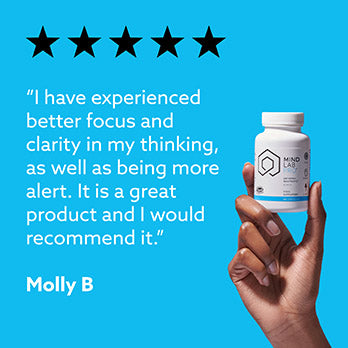Hurray, you've graduated from college! But what's next? For graduates who've long dreamed about being a lawyer, there's a simple answer to that question: the Law School Admission Test — more commonly known as the LSAT. The test is a requirement for anyone seeking to work in the field of law, and it very well may be the key to getting into law school.
If you're one of the 60,000-plus hopeful applicants of any given year, you may want to consider supplementing your daily diet with nootropics for LSAT. With acceptance rates at the highest-ranked law schools dipping to as low as 10%, any extra edge you can get on the competition should be well-received.
These natural supplement options may help students preparing for the LSAT in a variety of ways, including the following:
- Enhancing learning ability and recall
- Improving brain health
- Energizing the brain for extended study sessions
- Maintaining focus and concentration
This guide covers a selection of nootropics tailored specifically for individuals preparing for the LSAT. Each one of the included nootropics offers distinct mental advantages that could spell the difference between a high and low score.
The LSAT Lowdown

Preparing for an exam is absolutely critical for success — and even more so when the outcome of the exam could determine whether a person is allowed to pursue their chosen career.
First introduced in 1948, the LSAT has existed in its current form since 1991. It consists of 4 multiple choice sections that count toward the final score, 1 unscored experimental section, and 1 unscored writing section. The graded portion of the exam checks for proficiency in 3 main areas:
- Reading comprehension
- Logical reasoning
- Analytical reasoning
There are a number of challenges with the LSAT, the chief one being its long duration. Taking into account administrative paperwork and breaks, LSAT takers usually spend well over 4 hours sitting for the exam. The vast amount of content in the exam requires most students to spend as many as 300 total hours on prep work, which amounts to roughly 20 - 25 hours per week for a 3-month period.
Ultimately, the aim of the LSAT is to measure a student's ability to succeed in law school. It follows then, that hopeful testees would be wise to focus on boosting their proficiency in logic, reading, and verbal reasoning, not only to get into a top-tier program but to thrive throughout the course of their tenure there as well.
Nootropics Versus Smart Drugs
Before discussing the various benefits of nootropics for LSAT prep, it is worth noting the distinction between nootropics and cognitive-enhancing pills, or "smart drugs."
Natural Or Synthetic?
"Smart drugs" have been growing increasingly more popular in high-pressure, standardized test settings for their alleged ability to enhance cognition by altering the state of the mind. Several of these products have received approval from regulatory bodies following testing in controlled clinical trials.
However, these pharmaceuticals are primarily geared toward supporting patients' recovery from a mental condition and thus require a prescription. As such, the vast majority of students who use cognitive-enhancing pills obtain them illegally from unauthorized vendors.
Nootropics, on the other hand, are often defined as products absent of pharmacological side effects and widely considered to be safe unless proven otherwise. Though there exists a broad spectrum of nootropics — some of which are indeed synthetically made — the vast majority of nootropics are drawn from natural sources.
- To be sure, the nootropics recommended in this guide are not only naturally occurring but also legal in virtually every location across the globe.
Supplement, Not Replacement
Many pharmaceutical users mistakenly believe that simply taking certain products will help them score better on the LSAT or similar exams. But by original design, neither nootropics nor "smart drugs" can directly boost IQ.
- Taking nootropics should not be viewed as a replacement to studying but as a way to support the process instead.
What sets nootropics apart from generic pharmaceuticals is that they seek to optimize the brain's innate bioactivity and mechanisms. In contrast, many pharmaceuticals offer a quick fix that can end up triggering unwanted side effects down the line.

How Might Nootropics Help You Ace the LSAT?
The number of nootropic benefits that could potentially lead to better exam scores is vast and growing. However, there are a few standout effects that are particularly well-suited to the LSAT.
Learning and Recall Formation
From pinpointing flaws in arguments and constructing evidence-backed conclusions to comprehending the structure of a set of relationships, the LSAT demands a pretty expansive knowledge base.
Fortunately, several nootropics contribute to the learning process by supporting cognitive pathways that form new memories while also reducing the rate at which this information leaves the brain. Together, these effects could help students retain facts and strategies that they learn throughout the course of their long study period.
One of the primary compounds associated with memory is the neurotransmitter acetylcholine (ACh). Cholinergic nootropics may facilitate learning and memory retention by altering a couple of pathways:
- Increasing ACh synthesis: Some nootropics supply a high store of choline, a compound that is essential for the synthesis of acetylcholine.
- Decreasing ACh breakdown: Other nootropics can minimize the breakdown of existing acetylcholine by inhibiting acetylcholinesterase.
Enhancing concentration
Slogging through months of exam prep and the final 4-hour long test itself is no walk in the park, and sheer dedication may not always be enough to fit the bill.
To that end, various nootropics are capable of triggering the production or release of catecholamine neurotransmitters, which have long been linked to attention capacity. The most relevant neurotransmitters include the following:
- Epinephrine (adrenaline): stimulates the sympathetic nervous system — heightening brain function and memory.
- Norepinephrine (noradrenaline): mobilizes the brain and body for activity.
- Dopamine: serves as the central chemical messenger for motivation.
By regulating these catecholamines, certain nootropics may increase attention span and bolster concentration.
Stress Reduction
The LSAT is unquestionably a stressful exam due to its importance. The high-stress nature of finally taking the test can lead to an unexpected drop in score on test day, regardless of how well prepared a student may be.
A handful of nootropics have proved capable of reducing overall stress, which could arise from psychological reasons (i.e., anxiety), chemical factors (oxidative stress), or extreme temperature (very high heat). For the most part, these nootropics help alleviate stress by regulating the stress response activation pathway or preventing its over-activation.
How Does Studying For the LSAT Affect the Brain?
Recent clinical studies have shown that studying for the LSAT can significantly boost scores for the logical and analytical reasoning sections but result in hardly any improvement in the reading comprehension component.<1>
Using a brain imaging exam, i.e., functional magnetic resonance imaging (fMRI), researchers were able to correlate this increase in scores to gains in neural connections within the brain. In other words, practicing reasoning tasks can elevate activity in specific regions of the brain, leading to better scores.
- Therefore, students may want to focus on studying for the logic and reasoning sections of the LSAT.
In multiple clinical trials, various groups of students who worked on refining their reasoning skills demonstrated significantly more accurate answers and faster response times to LSAT questions as more neural connections accumulated in the frontal parts of the brain.<2> <3>
The Test-Taking Benefits of Nootropics

In case it wasn't clear enough at this point, studying is the only surefire way to improve LSAT scores. However, supplementing with brain-boosting nootropics for LSAT can help optimize the oft-draining process of studying. They can have an especially positive effect on the following areas:
- Concentration: attentive reading and learning in the midst of distractions.
- Learning: absorbing and retaining new information.
- Recall: remembering previously learned information.
- Stamina: enduring mental capacity.
- Mood: minimizing stress.
Though individual nootropics can have positive effects on studying, taking a combination of synergistic nootropics in a stack can augment their effect on the brain and produce even better results.
Mind Lab Pro® Nootropics for LSAT
Bacopa Monnieri
Highly regarded in the Ayurvedic community, Bacopa monnieri is an herbal adaptogen capable of delivering a wide range of nootropic effects:
- Improving cognition
- Supporting memory formation
- Reducing anxiety
- Protecting brain cells
Several clinical studies have shown that adults supplementing with Bacopa for several weeks achieved statistically significant improvements in scores for auditory-verbal learning tests, attention tasks, and recall exams, all the while experiencing reduced physiological measures of anxiety such as heart rate. <4> Other studies have demonstrated that people who took the herb retained new and old information for a much longer time than those who did not. <5>
These outcomes suggest that Bacopa could serve as a well-rounded supplement to enhance studying for the LSAT as well as ease students' nerves on test day.
The Mind Lab Pro® Bacopa Extract contains all 9 bioactive bacoside nootropics found in Bacopa, whereas some generic extracts supply only a handful.
More on Mind Lab Pro® Bacopa Monnieri
N-Acetyl L-Tyrosine
N-acetyl L-tyrosine is the premier form of supplemental L-tyrosine. This amino acid precursor replenishes the brain's store of catecholamine neurotransmitters, which, as previously discussed, are critical for effective brain function.
Studying for an exam as massive as the LSAT inevitably takes a toll on the mind, and this kind of mental stress rapidly depletes catecholamines from the brain. Supplementing with N-acetyl L-tyrosine enables the body to continue producing catecholamines at a sufficient rate — ultimately helping students maintain high levels of concentration and mental fortitude.
Though not recommended, late-night studying is extremely common among students. N-acetyl L-tyrosine is particularly well-suited to individuals who have a penchant for studying long after dark. A controlled clinical study affirmed that supplementation actually counteracted the mental impairments associated with nighttime work. <6>
What's more, research has shown that L-tyrosine offers a more pronounced benefit when taken for high-intensity cognitive tasks — such as those required for the LSAT — compared with more relaxed tasks.
More on Mind Lab Pro® N-Acetyl L-Tyrosine
Rhodiola Rosea
The flowering plant Rhodiola rosea is best known in alternative medicine as an aid for anxiety reduction. More recently, studies have indicated that this herbal adaptogen may also help brain function through several different mechanisms:
- Inhibiting the breakdown of neurotransmitters, including catecholamines
- Protecting brain tissue from oxidative stress
- Restricting levels of the stress hormone cortisol
Collectively, the bioactive ingredients in Rhodiola may be able to support brain function under stress, whether the stress derives from excessive studying or sleep deprivation.
In one clinical trial, researchers found that Rhodiola supplementation was associated with significant improvements in neuromotor test performance and mental energy in students when preparing for an exam. <7> Such potential benefits may be ideal for people studying for the LSAT.
As a Mind Lab Pro® stack, N-acetyl L-tyrosine and Rhodiola rosea have great demonstrated great synergy — enhancing cognitive function further than either supplement alone.
More on Mind Lab Pro® Rhodiola Rosea
Citicoline
Consuming 20% of the body's total energy, the brain is a highly demanding organ. When performing a task that requires elevated mental focus, such as taking the LSAT, the body calls for top-of-the-line energy metabolism.
The compound citicoline is often referred to as a brain energizer for its ability to optimize energy production in the brain. Beyond this effect, citicoline may also benefit LSAT takers in a number of other ways:
- Donating choline, which is a precursor of both acetylcholine (associated with memory and mental processing) and phosphatidylcholine (a core component of brain cell membranes).
- Protecting brain cells through antioxidation
- Promoting healthy blood circulation in the brain
Research has confirmed that citicoline is capable of sharpening attention and mental performance on cognitive tests. <8>
Supplementing with Cognizin® Citicoline from Mind Lab Pro® has been linked to an "improvement in the ability to accommodate new and relevant information within working memory and overall enhanced brain activation." <9>
More on Mind Lab Pro® Citicoline
L-Theanine
L-theanine, a constituent of green tea, may best be taken when undergoing full-length practice exams and on the day of the LSAT. This is due in large part to its ability to instill calm while simultaneously increasing mental focus and alertness. <10>
The underlying cause of this effect is a mixture of two fundamental mechanisms:
- Boosting the activity of alpha brain waves, which have long been tied to mood enhancement, mental clarity, and sharp thinking.
- Blocking glutamate receptors. Glutamate is responsible for excitatory signals. So inhibiting their activation helps mediate potential jittery side effects often triggered by stimulants like caffeine.
To take advantage of these benefits, students getting ready for the LSAT may want to consider opting for green tea, which contains L-theanine, instead of coffee as their daily source of caffeine.
Rather than downing cup after cup of green tea, students could take Suntheanine®L-Theanine in Mind Lab Pro®, which holds more than 10 cups worth of L-theanine in each serving.
More on Mind Lab Pro® L-Theanine
Conclusion
Mind Lab Pro® nootropics for LSAT facilitate peak exam performance by improving learning, memory, and alertness, as well as reducing test-day stress.
To be sure, nootropics cannot replace studying for the LSAT. Yet when combined with good study habits, they may markedly enhance an individual's preparation process and amplify the results. The Universal Nootropic™ Mind Lab Pro® activates a variety of natural biochemical pathways that can optimize the studying experience and ultimately help boost LSAT scores.
References
- Mackey A et al. Intensive reasoning training alters patterns of brain connectivity at rest. Journal of Neuroscience. 2013 Mar; 33(11): 4796-4803.
- Mackey A et al. Characterizing Behavioral and Brain Changes Associated with Practicing Reasoning Skills. PLoS One. 2015; 10(9): e0137627.
- Guerra-Carrillo B et al. Eye gaze patterns reveal how reasoning skills improve with experience. Science of Learning. 2018 Oct; 3(18).
- Calabrese C et al. Effects of a Standardized Bacopa monnieri Extract on Cognitive Performance, Anxiety, and Depression in the Elderly: A Randomized, Double-Blind, Placebo-Controlled Trial. Journal of Alternative and Complementary Medicine. 2008 Jul;14(6):707-713.
- Roodenrys S et al. Chronic effects of Brahmi (Bacopa monnieri) on human memory. Neuropsychopharmacology. 2002 Aug;27(2):279-81.
- Neri DF et al. The effects of tyrosine on cognitive performance during extended wakefulness. Aviat Space Environ Med. 1995 Apr; 66(4): 313-9.
- Spasov AA et al. A double-blind, placebo-controlled pilot study of the stimulating and adaptogenic effect of Rhodiola rosea SHR-5 extract on the fatigue of students caused by stress during an examination period with a repeated low-dose regimen. Phytomedicine. 2000 Apr; 7(2): 85-9.
- McGlade E et al, Improved Attentional Performance Following Citicoline Administration in Healthy Adult Women Food and Nutrition Sciences. 2012; 3: 769-773.
- Bruce SE et al. Improvements in Concentration, Working Memory, and Sustained Attention Following Consumption of a Natural Citicoline-Caffeine Beverage. International Journal of Food Science and Nutrition. 2014 Dec; 65(8): 1003–1007.
- Nobre AC et al. L-theanine, a natural constituent in tea, and its effect on mental state. Asia Pac J Clin Nutr. 2008; 17 Suppl 1: 167-8.




































